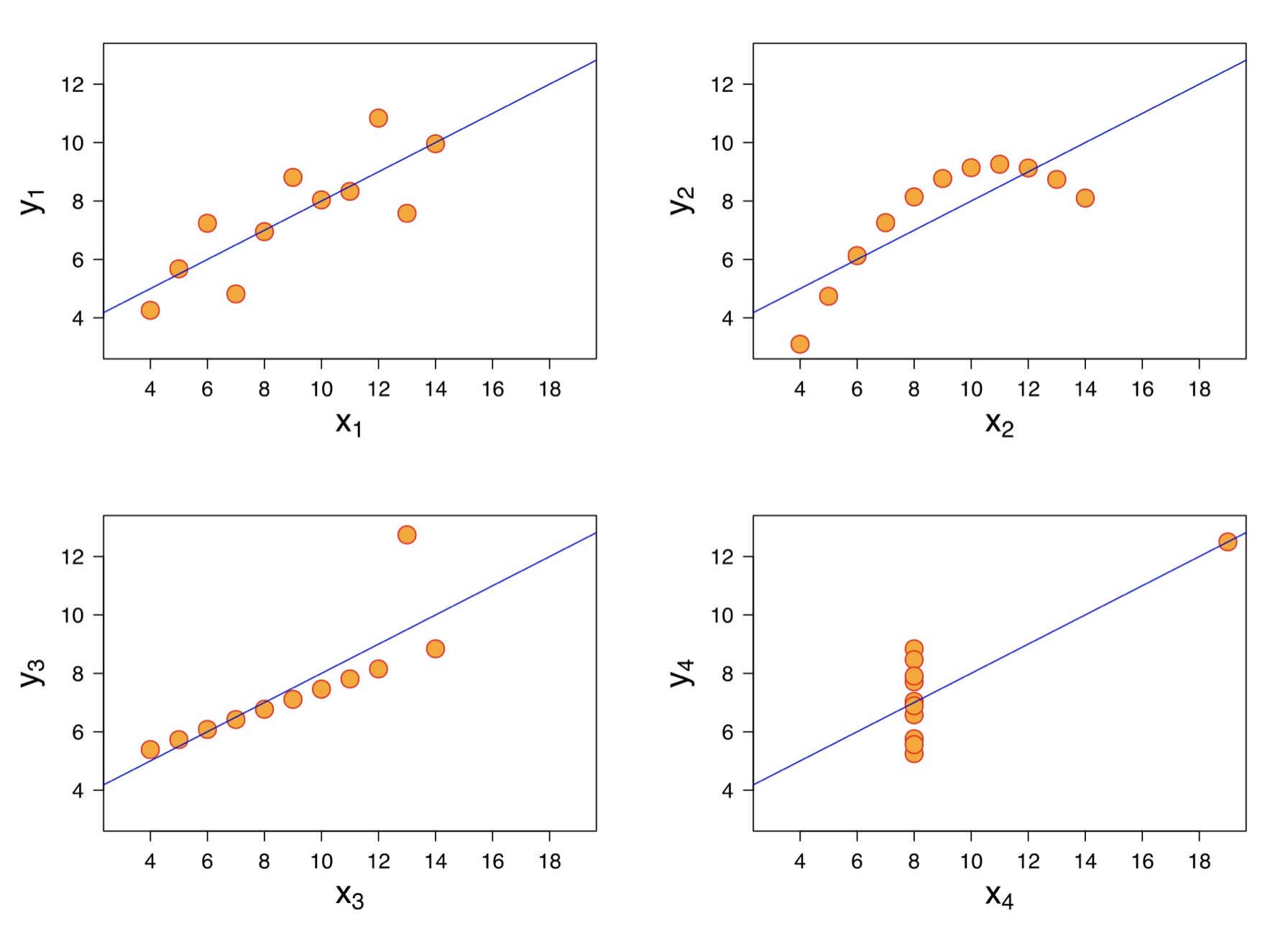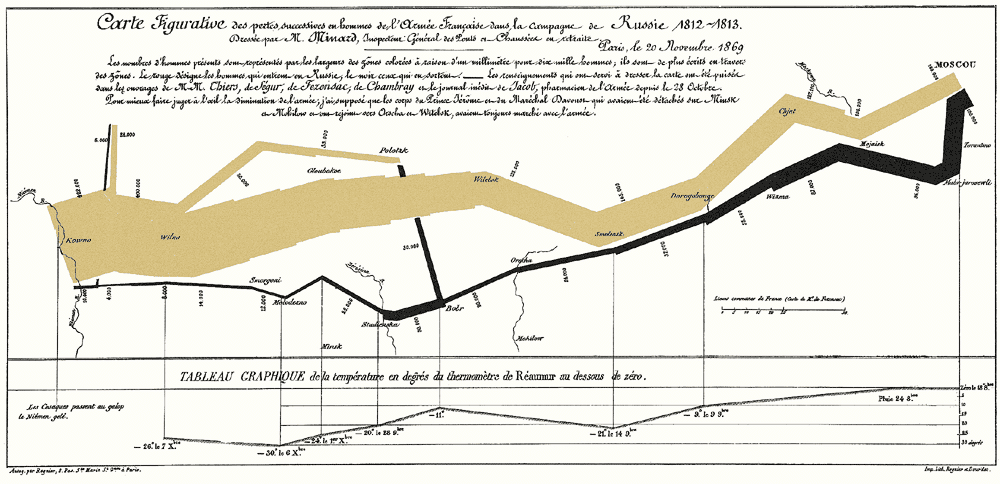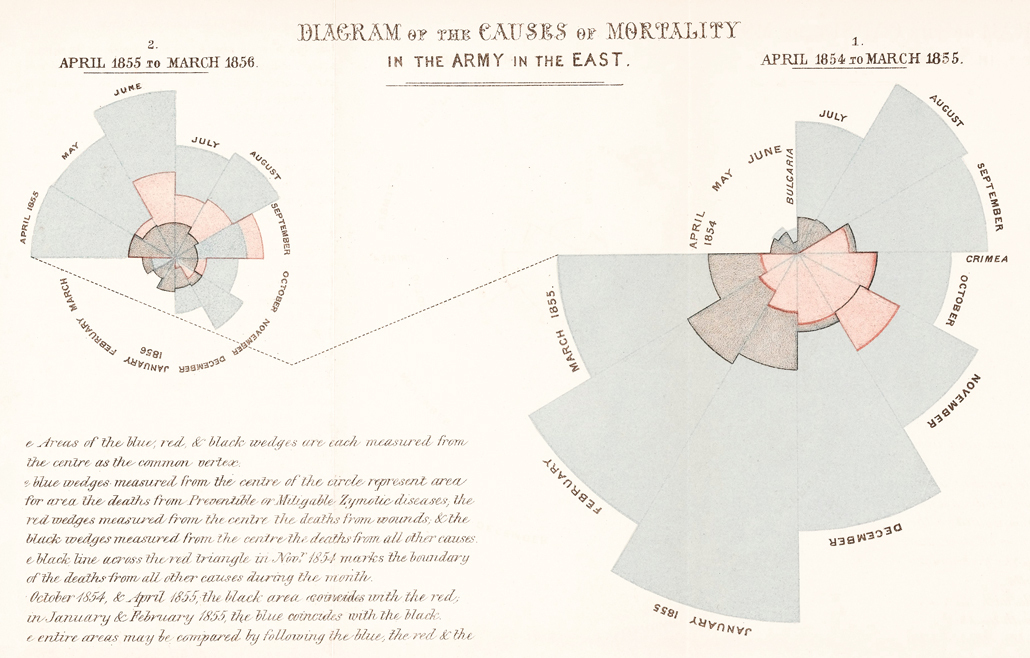Theory
- Students should be able to critique a visualization design.
- Students should be able to articulate and justify their designs using concepts related to visual perception and cognition.
Synchronous Lectures M/W 11:30a - 12:45p EST
(Fall 2023)
Data is everywhere, and it increasingly informs important decisions. For instance, analysis of cellphone data tracks the spread of a global pandemic, sensor data is collected and used to track and predict weather patterns, people sift through ratings and reviews to inform consumer purchases, researchers analyze patient data from medical trials to inform the success of new drugs, etc. Statistical summaries of data alone are often insufficient. People's perceptual skills allow us to see differences quickly and efficiently when data is visualized.
Furthermore, when visualization is combined with machine learning (in the form of visual analytic systems), there are dual benefits of human domain expertise and perceptual capabilities alongside machine accuracy and efficiency. In this course, students (1) will become acquainted with the fundamental theories in cognitive and perceptual psychology that drive visualization design, (2) will be introduced to the state-of-the-art in visualization research, and (3) will begin to develop the skills and proficiencies necessary to construct interactive visualizations using D3 and Tableau.
This is course is part of the Arts and Social Justice Fellows program for the Fall 2023 semester. Students will have the opportunity to work with an Atlanta artist and explore social justice issues relevant to the course topic.
When: M/W 11:30a - 12:45p EST, synchronous
Where: Math & Science Center W303
Lecture Slides: Canvas
Assignments: GitHub Classroom (programming assignments) and Canvas (everything else)
Discussion / Questions: Slack
Office Hours: here
Your attendance is crucial, because you will be working on your group projects in class. Your teammates will depend on your presence and engagement. Regular in-class quizzes will also count as part of your grade and cannot be made up outside of class unless your absence was university-approved.
Instructor: Dr. Emily Wall is an Assistant Professor at Emory University CS. Prior to joining Emory, she was a Postdoctoral Researcher at Northwestern University after completing her Ph.D. in Computer Science at Georgia Tech.
Artist: W.J. Lofton is an empathy-based artist, activist, songwriter, poet, and author. W.J. says, "I want my poetry to encourage change, to interrogate and seek to understand the human condition."
TA: Thomas Davidson is a first year CSI Ph.D. student. He joined Emory from Max Planck Institute.



Programming assignment starter code descriptions are available on GitHub Classroom. All assignments are due at 11:59pm EST on the due date.
| Objective | Weight (Grad) | Weight (Undergrad) | Description |
|---|---|---|---|
| 20% | 23% | All-Hands Class Project. | |
| 30% | 33% | Data-Driven Poetry. | |
| 25% | 28% | Homework Assignments. | |
| 13% | 16% | Engagement. | |
| 12% | Debate. |
|
|
|
|
|
|
|
|
For many of you, most CS assignments that you’ve had up until this point had clear, crisply defined goals that mapped cleanly to point values. This is impossible in a course that partially relies on design. Simply checking off each of the TODOs on an assignment does not necessarily mean that you’ve created a visualization that is easy and compelling to use. Rather than simply ask “Did you do this?”, there will be the question of “Did you do this well?”. This often translates to “Did you successfully apply the concepts we learned in class to this assignment?”. For example, if you build an app that is functional but breaks many visualization design guidelines or heuristics… that is not a successful application in this class.
Peer Evaluation: Some of the assignments that you complete will include some kind of peer evaluation. We will be critiquing each other’s work throughout the semester using the framing of I Like, I Wish, What If from Stanford’s design school.
Group Work: Group work can be challenging. As a result, in your group project milestones, you will submit a brief assessment of you and your classmates’ work. At the end of the semester, I may use these assessments to reweight the group portion of your grade (either positively or negatively).
Emory aims to cultivate a community based on trust, academic integrity, and honor. Students are expected to act according to the highest ethical standards. For information on Emory’s Honor Code, please visit here.
Any student suspected of cheating or plagiarizing on a quiz, exam, or assignment will be reported to the Office of Student Conduct, who will investigate the incident and identify the appropriate penalty for violations.
Unless explicitly stated otherwise, you are expected to complete assignments on your own. It is appropriate to discuss your ideas with others to gain feedback and help with sticky problems. It is not appropriate to find an existing solution online or from your friends, modify them, and submit as your own work. If in doubt, confer with your instructor. It is much easier to ask about these things than handle the consequences of a poor decision.
All assignments are due at the start of class on the day listed in the schedule. You will have a total of 3 “free” late days to use for any homework assignments as needed throughout the course (e.g., you can use 1 late day for HW1 and 1 for HW3, …). These "free" days can apply only to homework assignments and cannot be used for research presentations or group projects. These are for any cases where Institute-approved absences do not apply, and no reason must be given to use them. After the 3 “free” late days are used up, any late assignments will receive a 10% per day penalty. Assignments turned in one week or later past the due date will not be graded and given a 0. Note that you have to clearly note on your assignment if you want to apply your late days. This has to be done at the time of submission, not later in the course. Once you use them, you cannot switch them later in the course, so plan wisely.
Your success in this class is important to me. We all need accommodations because we all learn differently. If there are aspects of this course that prevent you from learning or exclude you, let me know as soon as possible. Together we'll develop strategies to meet both your needs and the requirements of the course.
I encourage you to visit the Office of Accessibility Services to determine how you could improve your learning as well. If you need official accommodations, you have a right to have these met. Students must renew their accommodation letter every semester they attend classes. Contact the Office of Accessibility Services for more information at (404) 727-9877 or email at accessibility@emory.edu. Additional information is available at the OAS website.
You can request a re-grade of an assignment within seven days of releasing the grade by sending an email to the course staff. The request should contain a written explanation of why you think that the grade is incorrect. We will look over your work again upon request. If we spot errors in grading, we will fix the error. This may end up assigning a lower score than the original if we find additional errors.
In your time at Emory, you may find yourself in need of support. Here you will find some resources to support you both as a student and as a person.
emily.wall@emory.edu
Office Hours: W 3:30pm-4:30pm in Math & Science Center W302E or virtually by appointment via Zoom
emilywall.prof
lofthouse.creatives@gmail.com
Office Hours: W 9:00am-10:00am via Zoom
thomas.james.davidson@emory.edu
Office Hours: F 1:30pm-2:30pm in Math & Science Center W302 suite, outside of W302E or by appointment via Zoom